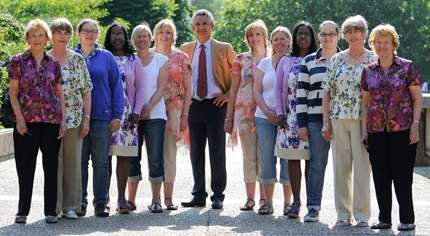Twin research comes of age

Thanks to thousands of volunteer twins, scientists have discovered over 400 novel genes associated with over 30 diseases over the last two decades, marking a golden era in genetic discovery.
The Department of Twin Research at King's College London, based at St Thomas' Hospital, celebrates 21 years of genetic research this week, highlighting key achievements and looking to the future of genetic research. The Department will celebrate this milestone with an event at St Thomas' Hospital in London this weekend, where hundreds of twins will take part in scientific experiments for research into pain, short-sightedness, hearing loss, skin ageing and telepathy.
The Department at King's is home to TwinsUK – the biggest UK adult twin registry of 12,000 twins. Set up in 1992, the TwinsUK cohort has had a major impact on genetic discoveries, allowing researchers to study the genetic and environmental causes of common age-related traits and diseases such as short-sightedness, osteoporosis, cancer, pain, diabetes and obesity.
The Wellcome Trust and the National Institute for Health Research (NIHR) Biomedical Research Centre at Guy's and St Thomas' and King's College London provide the core support for the cohort and Department at King's.
Professor Tim Spector, Director of TwinsUK at King's College London, said: 'This is a huge milestone for us and represents a coming of age landmark. We have published over 600 scientific papers using the data we have collected from the thousands of twins involved in our work over the last 21 years.
'TwinsUK is one of the largest twin registries in the world. The participation and commitment of the twins over the years has made a huge difference to our scientific knowledge of many common diseases, and our gene discovery programme has shed light on important disease mechanisms and many potential new drug targets.'
Talking about how genetics research has evolved since the TwinsUK registry was founded, Professor Spector said: 'Since we first began looking at twins we have seen the field of genetics research evolve significantly. In the beginning we used studies to look at the genetic differences between twins using questionnaires, studying common age-related conditions such as osteoporosis and osteoarthritis in particular populations. These studies showed us that 'old age' could not be the sole cause of these diseases as previously believed.
'Then came the advent of genome-wide association studies where we mapped the whole DNA of twins to identify the genes that influence the risk of disease. By identifying these genes we have provided potential targets for future medicines. But this does not provide the whole picture. We are now looking at epigenetics – how our environment and lifestyle can actually change our genes, switching them on or off. Twins are perfect for studying epigentics as we can clearly see that being born with the same genes does not mean they experience the same health throughout their lives. Why does one twin develop diabetes or heart disease and the other does not for example? By studying twins we can separate nature from nurture. With new techniques we can explore further the causes of common diseases and we are running the largest twin study in the world at the moment, looking at pairs where one has a disease and one doesn't. Early results in breast cancer, diabetes and depression are extremely exciting.
'We have experienced an unprecedented two decades of genetic research and could not have achieved this without our TwinsUK registry. I am extremely excited about what the future of genetics discovery will hold over the next 21 years, as we move onto an area of personalised medicine. I can envisage a time when a person's DNA will be taken at birth and measured repeatedly for epigenetic changes so medicines can be tailored to that individual. Twins will certainly continue to play a major part in this area of science in the years to come.'
















